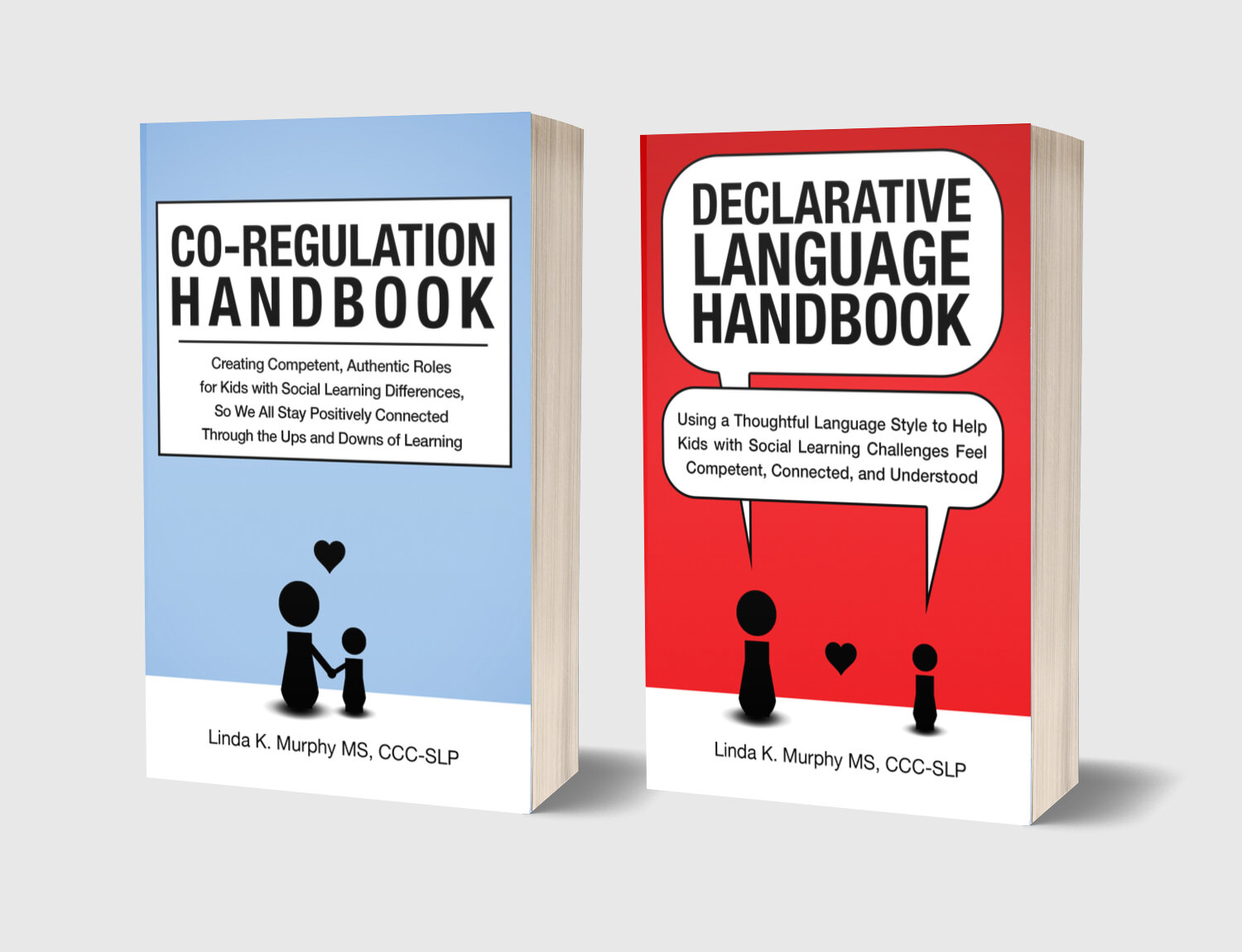-

Why did you write Co-Regulation Handbook?
I imagine most authors start to think about what to write next after completing a book. I have had this on my mind since I published Declarative Language Handbook in March 2020. I have another important topic to write about… keep reading
-

How are declarative language & co-regulation connected?
After finishing 𝐷𝐿 𝐻𝑎𝑛𝑑𝑏𝑜𝑜𝑘, I realized how important it was to also teach others about co-regulation. In this excerpt from Chapter 1 of 𝐶𝑜-𝑅𝑒𝑔𝑢𝑙𝑎𝑡𝑖𝑜𝑛 𝐻𝑎𝑛𝑑𝑏𝑜𝑜𝑘… keep reading
-

How are you talking about co-regulation in Co-Regulation Handbook?
I want to help co-regulation become an easy-to-understand concept for everyone. Co-regulation requires us to be present in the moment and open to all that our communication partner is giving to us. As we practice this… keep reading
-

Co-Regulation: What do I need to know to get started right away?
As we engage kids with co-regulation in mind, it leads to authentic social connection, communication that is mutually meaningful, and a greater understanding of each other. Enjoy this excerpt from 𝐶𝑜-𝑅𝑒𝑔𝑢𝑙𝑎𝑡𝑖𝑜𝑛 𝐻𝑎𝑛𝑑𝑏𝑜𝑜𝑘, Chapter 2: 𝑊ℎ𝑎𝑡 𝑌𝑜𝑢 𝑁𝑒𝑒𝑑 𝑡𝑜 𝐾𝑛𝑜𝑤 𝑡𝑜 𝐺𝑒𝑡 𝑆𝑡𝑎𝑟𝑡𝑒𝑑 𝑅𝑖𝑔ℎ𝑡 𝐴𝑤𝑎𝑦, where I explain… keep reading
-

How is co-regulation related to social communication & learning?
I am constantly thinking about co-regulation, and more specifically, how to best talk about it so people understand: what I mean, how I am thinking about it, why it is important, and how powerful it can be… keep reading
-

How long should these activities take? And can you give me some examples of things I can do at home?
As you get started with co-regulation, you will likely discover how much the small moments matter. There is so much goodness and learning that can happen when you engage your child in routines that take five minutes or less, using co-regulation as your foundation… keep reading
-

Can you give me an example of how to use co-regulation with homework or a school project?
My husband is generally a quiet person (unless you get to know him) and is more a man of action than words. One important trait that quieter folks tend to have, is that they are good listeners, and subsequently, learners. They might not have a long conversation with you about what they are hearing and learning, but you’ll see it at some point in their actions… keep reading
-

How can co-regulation help with executive function?
Use Co-Regulation! Enjoy this excerpt from Chapter 5 of Co-Regulation Handbook to learn more about an important mindset shift as we help older kids… keep reading
-

How can I apply the idea of co-regulation to older kids?
As promised, here is more information on what using co-regulation to support growing independence looks like, to help you learn how to approach, spot, and think about these learning opportunities. Remember. … keep reading
-

Do you have any other resources explaining co-regulation in this way that I could share with others?
I wrote this article in 2011, 10 years before I published Co-Regulation Handbook! Co-Regulation supports the development of so much – self-regulation, authentic reciprocity and conversation, and executive function – all of which I discuss in my new book… keep reading
-

Any video examples of co-regulation in action?
Ever since I learned of this definition of co-regulation, I have been on the lookout for it! I remember one day when the boys were young, and I saw them engage in this dynamic communication, or co-regulation, for the first time over an extended period of time…keep reading
-

What are the most important things to keep in mind as I use DL & CR?
I’m realizing it is important to have guidelines related to declarative language and co-regulation use all in one place. Whether these tools are new ideas to you, or you’ve been using them for a while, these guiding principles can help us all stay on track as we strive to create learning environments that support growth and positive engagement for individuals of all ages… keep reading
